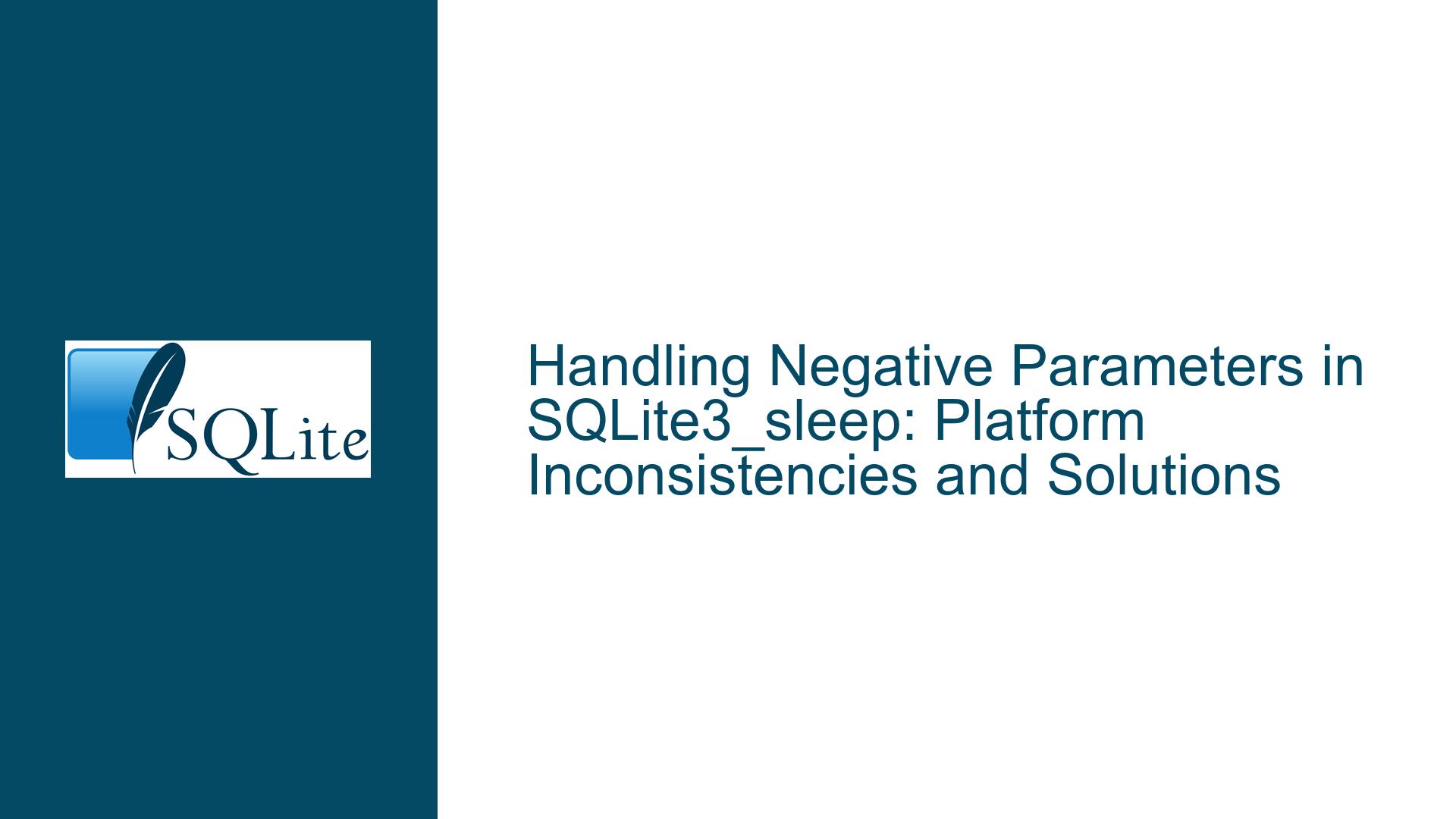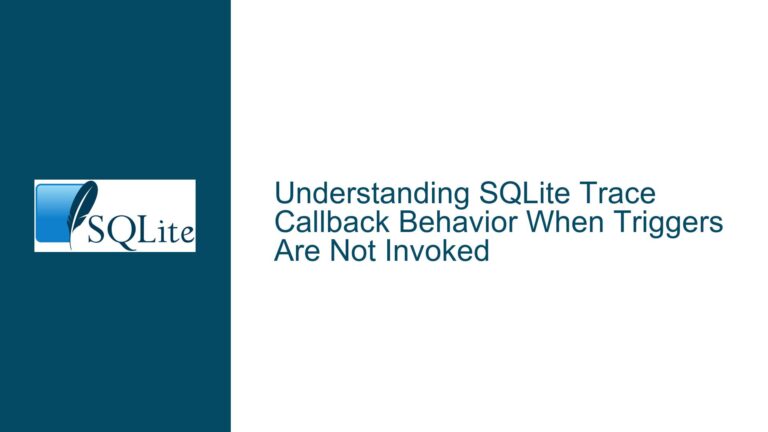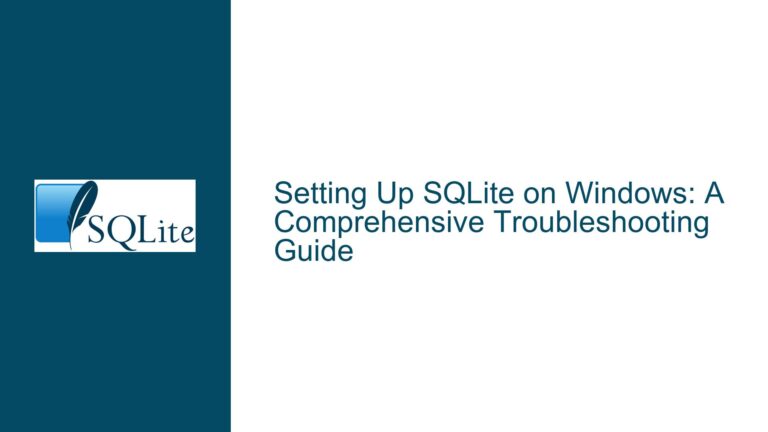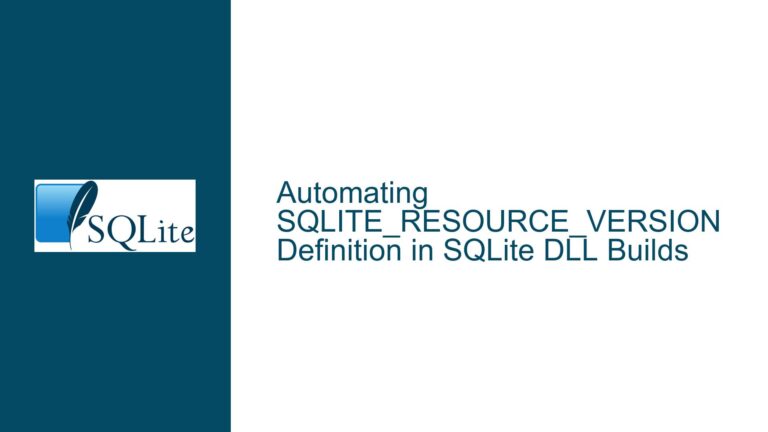Handling Negative Parameters in SQLite3_sleep: Platform Inconsistencies and Solutions
Understanding the sqlite3_sleep Function’s Behavior with Negative Inputs
Issue Overview: Cross-Platform Inconsistencies in sqlite3_sleep for Negative Durations
The sqlite3_sleep function is designed to introduce a delay in SQLite operations by pausing execution for a specified number of milliseconds. This function is often used in scenarios where controlled timing is required, such as rate-limiting database access, implementing retry logic for transient errors, or coordinating concurrent processes. However, the function exhibits undefined and inconsistent behavior when a negative parameter is supplied. This inconsistency arises from differences in how underlying operating systems and SQLite’s Virtual File System (VFS) layer handle invalid sleep durations.
The core problem lies in the lack of explicit documentation and standardized error handling for negative parameters. For example:
- Linux: Some implementations treat negative values as an infinite sleep (blocking indefinitely), while others treat them as zero (no delay).
- Windows: Negative values are universally treated as zero.
- macOS: Negative values result in an infinite sleep.
- Zero Parameter: All platforms correctly return immediately when a zero is provided.
This platform-specific behavior creates significant challenges for developers writing cross-platform applications. A negative parameter might originate from incorrect calculations (e.g., a timeout derived from a timestamp difference), integer underflows, or unvalidated user input. The absence of input sanitization in sqlite3_sleep exacerbates the problem, as the function does not return an error code like SQLITE_MISUSE for invalid inputs. Instead, it delegates parameter handling to platform-specific code, leading to unpredictable outcomes. Applications relying on deterministic timing may experience race conditions, unresponsive threads, or premature execution due to these inconsistencies.
Possible Causes: Platform-Specific Implementations and Missing Input Validation
The root causes of the inconsistent behavior stem from three interrelated factors:
Dependence on Operating System Sleep Mechanisms
SQLite delegates the actual sleep implementation to the host operating system. Thesqlite3_sleepfunction translates the input milliseconds into the format required by the OS’s sleep primitive:- On Unix-like systems (Linux, macOS), it uses
usleep(microsecond precision), which accepts a 32-bit unsigned integer. Negative values are implicitly cast to large unsigned integers, but someusleepimplementations clamp the value to zero. - On Windows,
Sleep(millisecond precision) expects a 32-bit unsigned integer (DWORD). Negative values are cast to a large positive integer (e.g.,-1becomes4294967295), but SQLite’s Windows VFS layer explicitly truncates negative values to zero.
- On Unix-like systems (Linux, macOS), it uses
VFS Layer Variability
SQLite’s VFS acts as an abstraction layer for platform-specific operations. ThexSleepmethod in the VFS is responsible for implementing the sleep. However, prior to SQLite version 3.42.0, the core SQLite engine did not enforce input validation before invokingxSleep. This allowed VFS implementations to handle negative parameters inconsistently. For instance:- The default Unix VFS passes negative values directly to
usleep, resulting in undefined behavior. - The Windows VFS clamps negative values to zero before calling
Sleep.
- The default Unix VFS passes negative values directly to
Undocumented Behavior and Lack of Error Reporting
The SQLite documentation does not specify howsqlite3_sleepshould handle negative parameters, nor does it mandate error reporting. This ambiguity permitted divergent implementations across platforms. Additionally,sqlite3_sleepreturns the number of milliseconds unslept, but this return value is meaningless for negative inputs since the function’s behavior is undefined in such cases.
Resolving the Issue: Standardization, Input Sanitization, and Best Practices
To address the problem, developers must ensure consistent behavior across platforms and prevent negative parameters from reaching sqlite3_sleep. Below is a comprehensive strategy:
1. Update to SQLite 3.42.0 or Later
Starting with SQLite 3.42.0, the sqlite3_sleep function explicitly clamps negative parameters to zero. This change standardizes behavior across all platforms:
int sqlite3_sleep(int ms) {
if( ms < 0 ) ms = 0; // Clamp negative values to zero
return osSleep(ms); // Delegate to OS with sanitized input
}
Verification Steps:
- Check the SQLite version using
SELECT sqlite_version();. - Upgrade using official binaries or by compiling from source.
2. Implement Application-Level Input Sanitization
Even with SQLite’s fix, applications should validate inputs before invoking sqlite3_sleep:
int safe_sleep(int ms) {
if (ms < 0) {
log_error("Invalid sleep duration: %d. Clamping to zero.", ms);
ms = 0;
}
return sqlite3_sleep(ms);
}
Key Considerations:
- Use static analysis tools to detect potential negative values in code paths leading to
sqlite3_sleep. - Add assertions or runtime checks for variables used as sleep parameters.
3. Cross-Platform Testing and Debugging
- Reproduce the Issue: Intentionally pass negative values to
sqlite3_sleepon target platforms and observe behavior (e.g., infinite block vs. immediate return). - Logging: Instrument code to log sleep parameters and actual sleep duration.
- Thread Monitoring: Use tools like
gdb(Linux),Activity Monitor(macOS), orProcess Explorer(Windows) to detect unresponsive threads.
4. Legacy System Workarounds
For systems unable to upgrade SQLite:
- Wrapper Functions: Replace all calls to
sqlite3_sleepwith a custom wrapper that sanitizes inputs. - Conditional Compilation: Handle platform-specific quirks using preprocessor directives:
#ifdef _WIN32 #define SAFE_SLEEP(ms) sqlite3_sleep((ms) < 0 ? 0 : (ms)) #else #define SAFE_SLEEP(ms) sqlite3_sleep((ms) < 0 ? 0 : (ms)) #endif
5. Documentation and Code Reviews
- Explicitly document that sleep parameters must be non-negative.
- Include negative parameter checks in code review checklists.
By combining SQLite updates, proactive input validation, and cross-platform testing, developers can eliminate inconsistencies and ensure reliable behavior for time-dependent operations.






